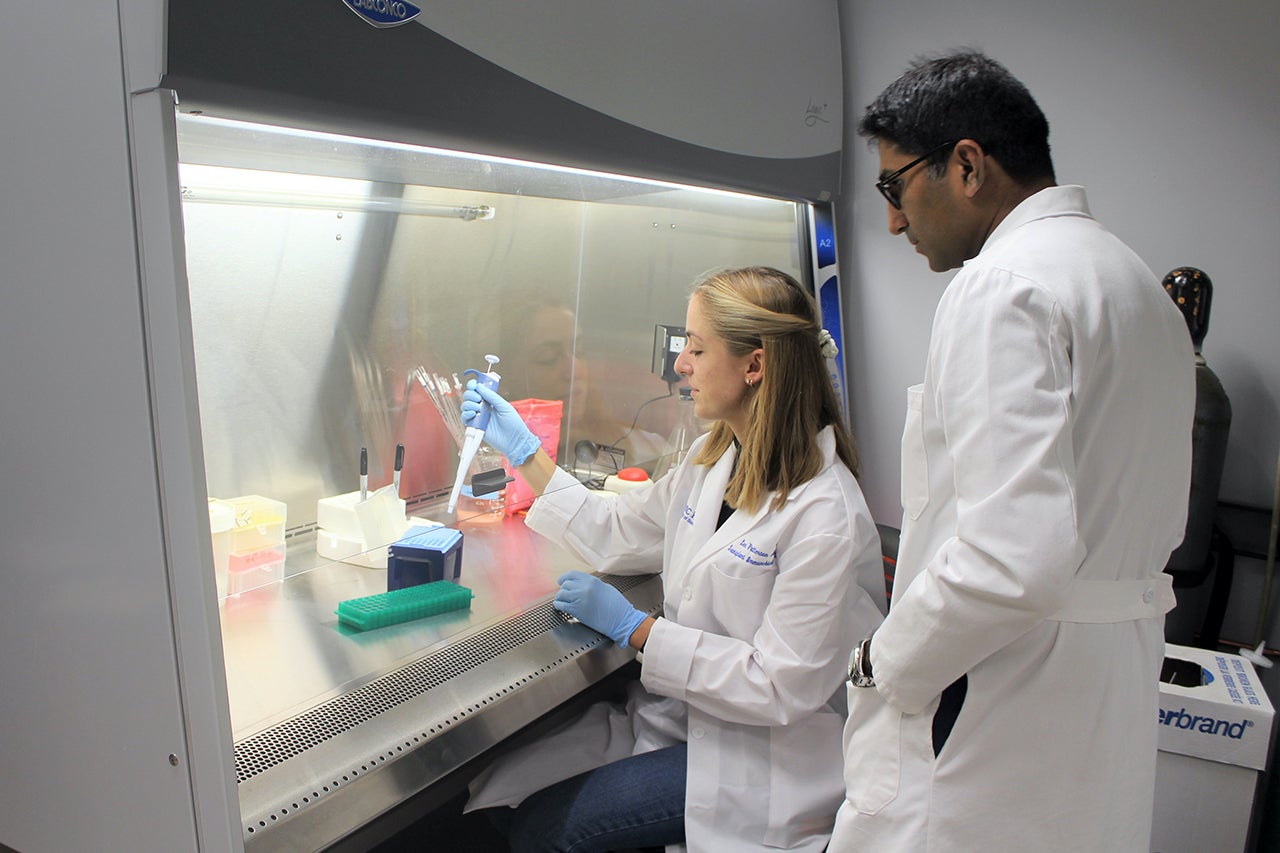When Kirsten Snyder saw the Pipeline for Aspiring Surgical Scientists (PASS) internship listed on the Honors College Hub, the biology major knew it was the perfect opportunity for her.
Offering an immersive 10-week laboratory and clinical research experience under the mentorship of Medical University of South Carolina (MUSC) College of Medicine’s Department of Surgery faculty, the PASS program was designed for College of Charleston Honors College students considering careers in surgery or medical science.
“For those thinking about pursuing an M.D./Ph.D. or M.D./M.S. graduate program, this is a great chance to gain practical experience,” says Honors College Dean Beth Meyer-Bernstein, who helped develop the program, which was initiated by Dr. David B. Adams, distinguished university professor of surgery at MUSC and vice chair of the Honors College Advisory Board. Dr. Adams connected Meyer-Bernstein with his former colleagues in the Department of Surgery, and together they created this unique opportunity for undergraduate students. “This really has the potential to serve as a life-altering springboard for their future.”
The PASS program started this summer: Making up the inaugural cohort of PASS interns, Snyder and fellow Honors students Isabel Muehleman and Caitlin Watts began conducting research in the MUSC labs and job shadowing their mentors on June 1. Thanks to the generosity of College of Charleston donors, all three students received a grant to help support their work at MUSC through the newly enhanced Honors Summer Enrichment Program. After a series of one-on-one meetings to help choose their ideal co-collaborators, the students and the Department of Surgery faculty members began their research/mentorship experience.

Isabel Muehleman working with her mentor, Michael Yost, Ph.D., vice chair of research in the MUSC College of Medicine’s Department of Surgery
Muehleman, a biology and Spanish major, is working in Dr. Michael Yost’s regenerative medicine bioengineering lab under the guidance of Dr. Sarah Grace Dennis-Little. Her project is evaluating novel biopolymers for their use in applications such as surgical site infection, radiation therapy and cardiovascular disease.
Watts is working with Dr. Vinayak Rohan, associate professor of transplant surgery, and Dr. Derek DuBay, the Fitts-Raja Professor of Surgery and division chief of transplant surgery. The biology major’s research with Dr. Rohan focuses on the effects of undergoing a gastric bypass/sleeve surgery on patients with prior renal transplants and how that will influence their kidney function and long-term transplant results. Her research with Dr. DuBay encompasses social determinants and kidney transplant outcomes.
Snyder, who has been conducting research since her junior year of high school, is shadowing Dr. Satish Nadig, transplant surgeon and scientist, and working in his research lab under the guidance of Dr. Dinesh Jaishankar. She is most intrigued with Dr. Nadig’s immunology research on how endothelial cells of transplanted organs — the cells on the inside of an organ’s blood vessels — are affected during the transplant process.
“I have done immunology research and bacteriology research on infectious diseases that incite immune reactions, so it has been very interesting to study the immune reaction itself,” says Snyder, adding that she had just taken Associate Professor of Biology Anastasia Maria Zimmerman‘s immunology class, “which helped me a lot.”
Drs. Nadig and Jaishankar are helping Snyder master a few important basic lab skills that she can use in her research career. At the same time, she is gaining knowledge about the delicacy of donated organs. For example, while donated organs sit in cold storage in an organ preservation solution for up to 24 hours to keep the metabolic rate as low as possible, there is still damage to the organ. Then, when the organ is introduced back to the body, the huge influx of blood flow can lead to more damage. All the damage can cause the endothelial cells to react, which in turn trigger the recipient cells to react.
“There is a huge risk of rejection with organ donations,” explains Snyder. “I like that Dr. Nadig is researching how to make such treatments more localized to the donated organ, as any medication given to the recipient may have unwanted effects in other parts of the body.”
While the research has been an incredible experience, shadowing Dr. Nadig has been path changing.
“Before PASS, I planned to focus on neuroscience or immunology,” says Snyder. “After shadowing Dr. Nadig, I realize that surgery would be an incredible path to follow. I attended his 6 a.m. kidney transplant surgery and was never so riveted in my life. Before I was leaning toward clinical trials, but after watching surgeries, my focus has shifted.”
Next summer, Snyder will be interning at the National Institutes of Health (NIH) looking at schizophrenia. Her NIH experience will help her narrow down her area of research and field of surgery even further.

CofC students with their PASS program mentors (l-r): Isabel Muehleman, Dr. Michael Yost, Caitlin Watts, Dr. Vinayak Rohan, Dr. Satish Nadig, Kirsten Snyder
In the meantime, she and the other PASS interns will participate in supplemental workshops and peer-to-peer collaboration alongside 12 other Honors students who are undertaking professional summer opportunities of their own. In November, the three PASS interns will present their work at the 2021 MUSC Research Day.
“The PASS program is designed really well,” says Snyder. “We each were paired with the right mentor, whose clinical and research focuses mirror our own. Even though you sometimes need to be in the OR super early or stay late in the lab, it’s worth it. I have found it to be very rewarding.”
The experience has been rewarding for the MUSC team, too.
“Translational scientists make up the backbone of innovation in the surgical specialties,” says Dr. Nadig. “The Department of Surgery at MUSC is pleased and honored to partner with the College of Charleston’s Honors College to give our next generation leaders an opportunity to learn and make an impact in the field of surgical science.”




